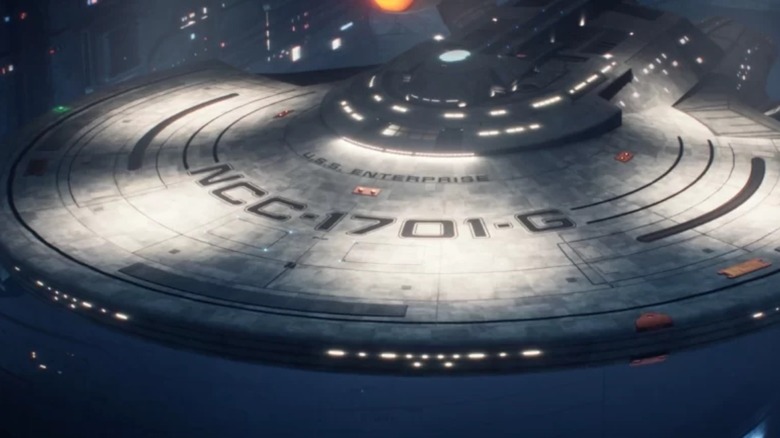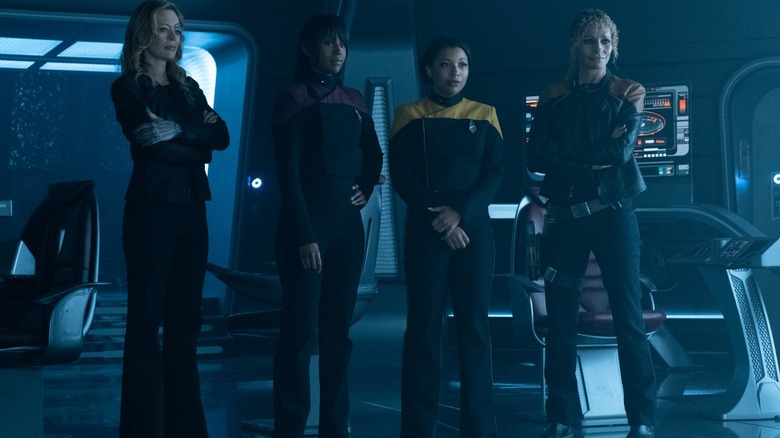Star Trek: Legacy Would Be A 'Mix And Match' Of Series Styles
There was an epilogue at the end of "Star Trek: Picard" that was set a year after the events of the season's climax. In it, Jack Crusher (Ed Speleers), the son of Jean-Luc Picard (Patrick Stewart), had already graduated from Starfleet Academy, having been placed on an accelerated educational track (the Academy is typically a four-year program). Already in uniform and bearing the rank of ensign, Jack was ready to be posted to his first starship. It was implied that Jack would be stationed on the U.S.S. Titan-A, the ship on which most of the final season's action took place.
While Jack was indeed stationed on board the Titan-A, there was a cute nostalgic twist for viewers. Just for funsies, Starfleet decided to rechristen the Titan-A as the Enterprise-G. Seven of Nine (Jeri Ryan) was to be the Enterprise-G's captain, and her ex-girlfriend Raffi (Michelle Hurd) was to be her first officer. New Enterprise, new Picard, a few legacy characters ... it seems like "Star Trek: Picard" was ready to spin off into a new series.
And indeed, "Picard" showrunner Terry Matalas has been very open about wanting to make a series called "Star Trek: Legacy" set on board the Enterprise-G. As of this writing, no such series has been greenlit, although multiple fan petitions have been signed. Matalas has also been very public about what he wants this potential show to be, and what kind of tone it might have. In a recent interview with ComicBook.com, the showrunner explained what kind of structure that possible show would have. He said that it could potentially be a mix of several different styles taken from across the Trek franchise.
Episodes or arcs?
From its inception in 1966 up until the later seasons of "Star Trek: Enterprise" in the early 2000s, Star Trek has remained largely an episodic show. There were multiple-episode stories here and there, and "Star Trek: Deep Space Nine" had seasons-long wartime backdrops, but the shows were made before television switched to broader, season- and series-long story arcs as a matter of course. Star Trek has since wrestled with which approach is more appropriate for the franchise.
Longer stories haven't done well for "Star Trek: Discovery" or the first two seasons of "Star Trek: Picard," but the third season of "Picard" availed itself well. Meanwhile, the more episodic modern Star Trek shows "Strange New Worlds" and "Lower Decks" are doing quite well with a retro approach. So which approach was "Legacy" poised to take? Matalas was diplomatic, saying:
"I think it could be a mix-and-match. Again, let me be clear: there's nothing in development. It's just an exciting pie-in-the-sky idea. But it would mix and match. But I would love to go back to the spirit of 'Star Trek: The Next Generation' quite a bit."
The series that ran from 1987 to 1994 was, of course, an episodic TV series that only occasionally presented two-part episodes when it had the leeway to get ambitious, or when it required a cliffhanger ending to one of its seasons. It sounds very much like Matalas wants an episodic structure, but is very much open to longer arcs, should that be a requirement for "Legacy" to get made.
Captain Seven of Nine
Matalas pointed out that the third season of "Star Trek: Picard" was presented as a reunion of the main cast of "Star Trek: The Next Generation," but was actually more in keeping with the spirit of the Star Trek feature films than with any of its previous TV iterations. "Picard" had a single story, action-based stakes, and even borrowed Trek's cinematic music cues quite liberally. Matalas feels "Star Trek: Legacy" would likely not have that same vibe. He said:
"This last season of 'Picard' is not a season eight of 'Star Trek: The Next Generation.' It's more 'Star Trek XI.' It's a movie. The characters are much closer to their cinematic versions than they are 'Star Trek: The Next Generation' versions of their characters. I would love to go back to the spirit of 'Star Trek: The Next Generation' as much as you can, but we'd have to see if it would be possible. Who knows?"
Matalas, it seems, would like a "Star Trek" series that skews more in the direction of exploration, character building, and miniature morality plays. Action-packed movie-like climaxes may be off the drawing board for "Legacy." It's worth remembering that Star Trek has always been better when it eschews action for more cerebral stories and cleverer storytelling plots.
It appears that between Matalas' ambitions and the three seasons of Seth McFarlane's "The Orville," several fans are trying to recreate the glory days of "Star Trek: The Next Generation" in new forms. All this tells us for sure is that NextGen, for whatever silliness and terrible first-season episodes it may boast, is where a lot of people's minds go when they think of Star Trek now. As a dyed-in-the-wool NextGen Trekkie, I welcome this line of thinking.


